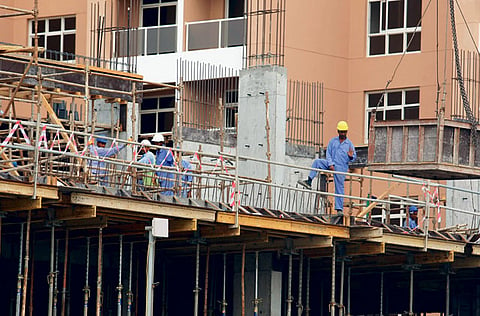Dubai Silicon Oasis set to be world class multi-function zone
Development to include various technology-related industries

Dubai : Dubai Silicon Oasis (DSO), which spans 7.2 million square metres along Emirates Road, aims to become a world centre for electronics, research and development.
The development has developed more than 30 per cent of its industrial land, which spans 1.2 million square feet or 35 per cent of the area.
Since its inception in October 2005, the government-owned free zone has attracted a number of technology manufacturing companies, educational institutions and foreign investments in technology-related industries.
Examples are solar energy, plasma screens, telecommunications services and chip design. DSO currently hosts the likes of Hitachi Data Systems, Western Digital, Fujitsu Computers and Lisec.
The development will include 1,047 villas, over 37 commercial towers, world class educational institutions, health care and lifestyle facilities.
Incentives
In its bid to attract international IT companies looking to set up their regional headquarters and research and development divisions in the MENA region, DSO offers a wide range of incentives including 100 per cent ownership, capital repatriation, state-of-the-art infrastructure, low overheads, comprehensive logistics support, accessibility to talent, competitive tax free environment, and flexible employment policies.
The Dubai Silicon Oasis Authority has set up two technology centres at established international tech markets to attract the latest in technology developments.
The first, located in Silicon Valley in California, is positioned to promote DSO's image internationally.
The second, located in Europe, will endorse the services of the Dubai Circuit Design Centre among foreign companies.
Another feature of DSO is its Time Group Middle East office, a unit of the Beijing-based company, which is setting up a Dh360 million plant with a production capacity of more than one million units of personal computers, plasma televisions, and LCD monitors. Dr Mohammad Al Zarouni, vice chairman and chief executive officer of the Dubai Silicon Oasis Authority, remains positive.
Short-term investments
"In order to ensure that the projects at DSO are not affected, we have devised a carefully studied and flexible plan focusing on short-term investments without forsaking our long-term goals," he said.
His confidence is demonstrated in DSO's ambitious expansion plans. DSO is evaluating the preliminary stage of the Phase-3 expansion of its headquarters.
Spanning 190,000 square feet at an investment of Dh3 billion, Phase-3 aims to host over 500 new IT related companies. Foreign investments have so far amounted to Dh1.4 billion.
Investments in Dubai Silicon Oasis include Dh13 billion of private investments in the freehold real estate development and DSOA's Dh650 million investment in infrastructure, Dh10 billion for the development of the third phase of the offices and light industrial units, as well as specialised companies in high-technology industries and micro-electronics, bringing the total investment to more than Dh25 billion, he says.
Within the development, a wide variety of villas and apartments are available for both lease and freehold purchase. To enable a self sufficient community, DSO houses 1,047 villas which come in three styles; Arabic, traditional, and modern.
The size and structure of the villas can be separated into four categories; luxury villas, executive villas, twin villas, and town house villas.
Within the residential pocket, 570 units house Emirates airline captains, first officers and their families. DSO customers and employees who choose to live in the area are also able to take advantage of subsidised rents.
Nestled among the technology related offices are a number of educational institutions. GEMS smart school will provide students with an opportunity to experience emerging technologies first-hand and will offer the English national curriculum to 2,200 students.
Rochester University of Technology (RIT) will contribute to building and developing a broad base of talent and experience in the technology sector.
The university which began its courses in August 2008 currently provides masters programmes in finance, human resource development, service management, electrical engineering, mechanical engineering, networking and systems administration.



